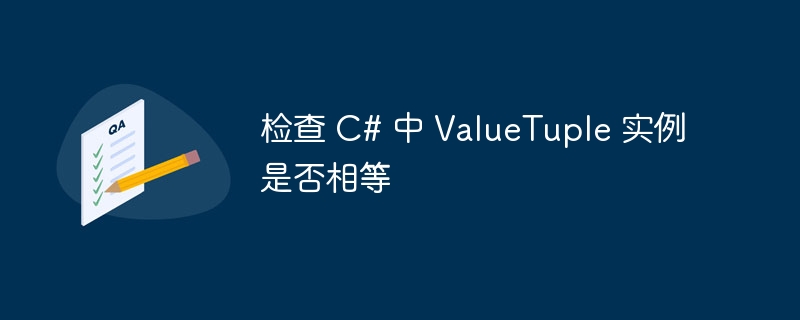Home >Backend Development >C#.Net Tutorial >Checking ValueTuple instances for equality in C#
Checking ValueTuple instances for equality in C#
- PHPzforward
- 2023-08-26 22:33:05649browse

In C#, ValueTuple is a structure type that can be used to create a lightweight, self-describing tuple that can contain multiple fields. Comparing two ValueTuple instances for equality is a common requirement in various programming scenarios. This article will guide you through the process of checking if two ValueTuple instances are equal in C#. By the end, you'll be able to confidently determine if two ValueTuple instances contain the same elements.
理解C#中的ValueTuples
Before we delve into the comparison, let's first understand what ValueTuples are. Introduced in C# 7.0, a ValueTuple is a value type representation of the Tuple. It is a structure that allows an ordered sequence of two or more elements, known as items, to be bundled together. This structure can be used to group values without having to create a new class.
这是一个ValueTuple的示例 -
var employee = (Id: 1, Name: "John Doe", Role: "Developer");
In this example, employee is a ValueTuple with three items — Id, Name, and Role.
比较两个ValueTuples
Comparing two ValueTuples for equality is straightforward in C#. You can use the == operator to check if two ValueTuples are equal.
Example
这是一个例子 −
using System;
public class Program {
public static void Main() {
var employee1 = new { Id = 1, Name = "John Doe", Role = "Developer" };
var employee2 = new { Id = 1, Name = "John Doe", Role = "Developer" };
if (employee1.Equals(employee2)) {
Console.WriteLine("The employees are equal.");
} else {
Console.WriteLine("The employees are not equal.");
}
}
}
在这段代码片段中,我们首先定义了两个ValueTuples employee1和employee2。然后我们使用==运算符来检查employee1和employee2是否相等。
输出
The employees are equal.
深入探讨ValueTuple的相等性
在比较ValueTuples的相等性时,重要的是要注意比较是逐个元素进行的。这意味着如果两个ValueTuples中的每个对应字段都相等,则认为它们是相等的。
此外,ValueTuple的Equals方法和==运算符执行的是值比较,而不是引用比较。这意味着它们会检查实例是否具有相同的值,而不是是否引用同一个对象。
Conclusion
在C#中,ValueTuple提供了一种方便的方式来将多个值捆绑在一起。通过使用==运算符,比较两个ValueTuple实例的相等性是一项直接的任务。通过本文所获得的知识,您现在可以有效地检查在您的C#编程之旅中两个ValueTuple实例是否相等。
The above is the detailed content of Checking ValueTuple instances for equality in C#. For more information, please follow other related articles on the PHP Chinese website!

